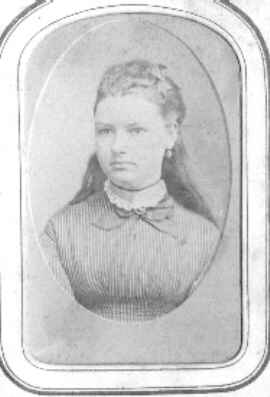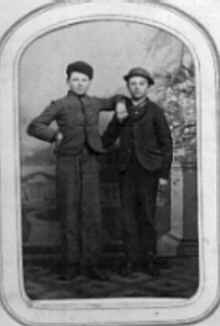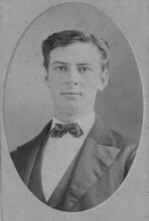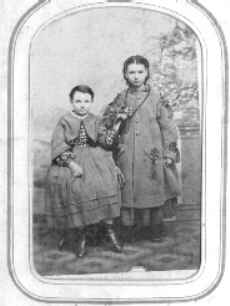Naperville, Illinois, 1855-1936

Mary at about Age 16
| Winter A.M.’s up
early, built
kitchen
fire, and to barn to do chores, taking care of horses, generally two
span,
perhaps a colt; and 2 to 4 cows to milk; hogs to feed, and breakfast
early.
Often used to sit down and study (Mary did) by candle light, and Mother often was spinning before daylight. Father helped with washing, often before light...hanging clothes out, bringing in. Always Father and Guy kept woodbox full, summer and winter. Snow shoveled up to gate in Naperville, a long walk, and down to spring and to hen house, etc. Favorite place for sliding
down
hill
was the spring hill...very steep and required some skill to keep out of
spring. Would take part of Learned to skate (Mary did) in puddle in front of house with other girls, often used to go to river a mile west of town and a few times had boys push us down to mill pond 3 miles or so. One time when it was 2, 4 or 6 below zero we girls and boys went to river, and all but Emma Hannah skated. Emma froze her feet to bleeding. Guy [was] a fine skater and could endure cold. (Picture at right is Ida May Babcock and Mary Colt Sabin, Naperville, Illinois, c1864).  We at home saw them coming and it was all Guy could do to get to house, and he came near giving out. Nick went back and started up work again. I (Mary) saw Nick H. in summer of 1907 and he told me the story over again. He was then over 80 and was still working around doing odd pieces of work as he did, but taking it easier than he had. At the house of his grandaughter was a friend who lived there that once worked for Father, David Fry, and he remembered all the family, but I only remembered the name. Nick told David the story of Guy. Said Father was always helping anyone out of trouble, and never would take a cent. Several times I have known Guy to cut grass all night during moonlight nights, when pressed for time and hay just right. Two or three times have known Father to go and draw in several loads of hay when was ready and thunder storm threatened, but never worked on Sundays. Farm was divided by R.R. and necessitated crossing tracks. Kept sheep generally, and shearing was great time as men had luncheons both forenoon and afternoon, and, at first...being custom of farmers, they had beer...but mother objected, and then would serve drinks...coffee or drinks that she made, and they had good luncheons. Whenever we heard horses backing out of barn was signal to take pail and run to spring for cold water, and often would drive up to kitchen door and take the luncheon...when going to hay field...and eat it on way. Sheep would be marked with a stamp of tar after being sheared and turned out in yard. Washing sheep was done by driving to river, and Guy was always one of the men who went in water and kept his end up with the men in numbers. Horses were taken to spring to drink, and often they were let out and came back. Sometimes I (Mary) would be permitted to ride them to and from brook, which was quite a thing.  Thrashing was a great time, and
we
attended,
and also hog killing. That day We girls would all be in Grandmother’s bedroom window, or what used to be, and later was Mother’s, and then Grandmother’s again when new addition was built at time, or just before Fannie was born. Every girl would have a pig’s
tail,
and
Guy and I would fix them up with salt, The butcher would stay, and all meat would be cut up, sausage meat made, and before he left we generally had some cooked. The next day would come the lard, and sometimes that would be cut up same day, while men were busy with the meat. Tripe was scrapped, as generally we had a beef killed at the same time. Later years we would buy a half, and then a quarter. When [we were a ] boy and girl we had our apple bin down [in the] cellar, and would take candles and go down. Along toward spring it was a task to get a basin of nice whole apples, and we would think every time we could not find any more, but generally did. Popcorn was on hand...always a large pan of it every Sunday. At Gilman, Guy and I would spend most of our time before dark in summer eating berries. Often would go out for pan of grapes, and get as far as doorstep and begin to eat, and would have to go again for another pan full. Had fine span of horses there which I drove for years. Guy brought one colt from the North...Gypsy...that we kept for some time at Gilman, and sold to Ed Peckins, a friend of Guy’s.  Summers, played shinny with the
boys,
and
when croquet was first played we  We girls would often go to hay
field
and
rake hay, and then ride on load and Had a fine swing and generally
played
there
as children. Kites same as they have now, but home made. Guy would be teased for days to draw me to school on sled and catch onto teams holding my sled, but he did not care much for “this job”, and they were few and far between. Father would come for us girls to school when we had a blizzard and bring blankets to put over our heads. About 13 or 14 Guy had a colt, and I dearly loved to ride and would beg him to go and promise everything I had. What he then cared for most was to shoot revolver, and I would promise him a box of cartridges. His reason was [that] I could not ride fast enough. I remember one Sunday (our folks had gone out in a carriage...one Father bought in Chicago, a hack lined with a light gray), and we were riding, or, rather, running the horses past College. Folks saw us, and that happened to be the last time I remember of riding horseback. This was same colt that Guy took with another on trip to Gilman, across country, and was sick. He stopped at Mr. Bush’s near Joliet, and had to leave it and got another to go on with. On the back it just got home and died. We used to attend sociables, and Mother always wanted us to go early as to get back in decent time. We would walk up and down in front of houses to wait until we saw others go, and then go in. One night I remember a sociable at Old Mr. Scott’s that we started for early for. Coming home “Himie” (Hiram Cody) asked if he could come home with me, and Guy came behind...about my first. Used to take apples to cider mill between Naperville and Warrenville in lumber wagon, and some of us girls generally accompanied the wagon and drank cider through straws. Packing wool was done after it was tied up in fleeces, which Father did in large barn during shearing. Quite a rivalry was shown by the men in shearing. Machine was one that had four strings each way and was folded with white side out. The four side of machine set up and strings which were laid each way on machine, were fastened in a groove at the top. Each one was tied, making 8 knots for each one. The sacques into [which] wool was packed were of sacking like coffee sacking, and Guy or someone would stamp them down. These sacques were generally sold to some wool buyer.  They would stay at some hotel- Garden City House was one- and go to theatre in evening. Once they tell a story of Auntie who stopped before they got to place in City, where they stopped and walked instead of riding on load. When the first dollar stores came into existence they attended and brought home bargains. When C.B. & Q was built, the Civil Engineer and some of his men boarded with us, and with that money was bought the gold back china. Name was Coolidge. His wife came out for visit and brought Guy and I first cream candy done up in tissue paper I ever had. Guy had fine record as boy, scholar and always. When quite young had occasion to teach Miss Kate Cunningham’s room (now Mrs. Castle), boys and all that they would do as they pleased. At the first sign of disturbance, Guy took a boy by collar and brought him over a seat, and that was last of trouble. [Guy] was a fine ball
player.
4th
of July used to take large boxes and set them up, and call them
forts.
When Babcock children came out we were up early and began our
fireworks.
To buy them we had one egg out of every dozen and had a few
bunches.
The colored yellow and green ones were cherished carefully , and a few,
perhaps 2 bunches of torpedoes was extent. Generally 4th of July, Thanksgiving, Christmas and New Years the two families were together and [we had] a big dinner. Christmas always had a tree. First time I knew of Santa Claus was night I heard candy rattling that they were filling stockings with. We always had our stockings hung on mantel piece, and Father would have a long one of Mother’s and hang it next [to] ours (but didn’t get much in it). We girls had to knit a new pair for Christmas, even when quite small- 5 and 6- and learn the Christmas story.   Was at that time he was working out some problem that had baffled the class for days. It was some time before he got it, and then Professor said he had always explained it another way. Guy told him he could not prove it that way and showed him why. It was a big feather in Guy’s cap. Professor was H.H. Rassweiler. Father would call up pipe and ask Guy if he had it yet, and Guy would say, not yet but he will before long. Never gave up. Guy was generally the one among the young folks who took his team, and we had the long sleigh rides to the Babcock farm, starting about 5:00, and [a] number of times it was 25 and 26 below. One night in particular Fred Babcock had gone over to the Blairs’ for Belle, and as he drove up to our gate, Father was waiting to take Fred’s team, and he and Belle got into our load and we drove the 14 miles. We had hot bricks in our laps and at our feet. The last trip we took was one that I drove with Mr. Woodside, and on [the] way back, Guy and Nannie sat on front seat, and we all said it took us an hour to get to Brush Hill...or Fullersburg it now is. McCullough, one of the boys, had just gotten up from typhoid, and got so cold [he] had to get out and walk to keep warm. We had several trips to Babcock farm. Do not remember of but one ride that we did not take out team. Coming home about 4:00 A.M., [it] got so cold we girls had hard work to unpin our wraps, and the boys said all they could do to get harness off the horses. Father used to say we young folks did not know much to want to go when so cold. [I] remember stories he used to tell of their going to parties at Joliet, 20 miles from Naperville. [They] would start in afternoon and the girls would change their dresses for the big dance, and not get home until next day. In Father’s day, they had what they called “a gathering together”...very informal. Winter of ‘73 we built [the] house at Gilman, and Father was there much of the time, and Guy ran the home farm at Naperville. Had but the one span of horses at time we left Naperville. Sold farm in ‘72 (?) and sent car load and then took load down in spring. Night before we left old home, [we] had a large party, and all brought their refreshments. Had big fire built in fireplace and mantel caught fire, which was put out. Frank Dwyer, Fred and Guy slept in house on floor, and I staid at Celia Ditzler’s. Mother and Father , with Daisy (one year old), [stayed] at Mrs. Russell Peck’s. April 1, 1874 Father, Fannie (2 1/2 years old), and ------- drove carriage, and Fred and Guy with Father’s team started for Gilman. Bad, raw day, and snowed quite a little on the way.----------Daisy with Jessie staid at Babcock farm, and Daisy had whooping cough. [They] kept her there for about 6 weeks, and we lived in the little house on Gilman place, and Guy and Fred had room at [the] large new house. They shot a good many rabbits which we had roasted, calling them Norway roasts. A wet spring, and they had to wear rubber boots to get to and from house. Staid a few nights at Peck’s. First Sunday at church all had giggles and made ourselves ridiculous, the girs and Guy was always sober and made us laugh is spite of ourselves. First summer had a fine time with young people and parties galore. Next fall he went back to College and boarded at Ellsworth with Wallace Bush. We drove to Naperville first year after leaving, and attended commencement, and had a picnic at Butterfield Lake, and [I] think your mother can tell you what happened then. (This obviously was addressed to one or more of Guy Sabin and Nannie Sevier Sabin's children) Guy was home that summer. Think he went to Chicago and began to read law in Kerr & McGruder’s office that fall, and boarded at Rogers’. Studies too much and eyes gave trouble, and [he] had to leave. He was married in fall of 1876 to Nannie Sevier, who had attended N.W.C. in ‘72,’73 & ‘74, and home in Jonesboro, Tennessee. [They] staid at Gilman winter of
‘77,
and
was in egg business with J.H. Boynton. Met at Gilman [a]
Dr.
W.C. Dodge, and they went to Bellevue, Michigan and into Drug
business
in 1877, in spring. Bert was born in August ‘77. (This was my
grandfather, Albert Sevier Sabin).
Note: Many of the friends mentioned in this memoir, and in
Guy
Sabin’s
diaries from Although Mary Colt Sabin obviously had many beaus, she never married. Her youngest sister, Fannie, became a professor of Latin at Columbia University in New York. Mary , Daisy and Fannie lived in New Rochelle, New York for many years. The elder Sabins and Ellis’s remained in Illinois, moving to Gilman in 1874, and then to Hinsdale to be near relatives. My great-grandfather, Guy Ellis Sabin ( 1853-1888) and his family moved in 1887 to his wife’s hometown of Jonesborough, Tennessee, where he practiced law and was the chief of the first volunteer fire department in Jonesboro. In 1888, when their fifth child was only 3 months old, Guy was killed while fighting a house fire. |
Pat Sabin
Back to DuPage
County IL
History
DuPage County
Diaries
and Letters
 bob sled and slide
down hill at side of
front yard, and generally had the children of neighborhood: Hannah
girls
( Mary, Emma and Belle), and Hattie Peaslee, and two Schwartz boys, Jep
(nickname for Jacob) was a particular chum of Guy’s, even though his
nose
was flat. They lived directly opposite, their father being a blacksmith.
bob sled and slide
down hill at side of
front yard, and generally had the children of neighborhood: Hannah
girls
( Mary, Emma and Belle), and Hattie Peaslee, and two Schwartz boys, Jep
(nickname for Jacob) was a particular chum of Guy’s, even though his
nose
was flat. They lived directly opposite, their father being a blacksmith.